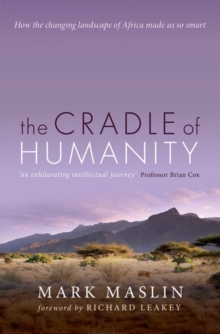Description
| Product ID: | 9780198704539 |
| Product Form: | Paperback / softback |
| Country of Manufacture: | GB |
| Title: | The Cradle of Humanity |
| Subtitle: | How the changing landscape of Africa made us so smart |
| Authors: | Author: Mark Maslin |
| Page Count: | 272 |
| Subjects: | Popular science, Popular science, Evolution, Evolutionary anthropology / Human evolution, Evolution, Early man |
| Description: | Select Guide Rating What drove the evolution of humans, with our uniquely big brains? The Cradle of Humanity presents fascinating and controversial new research which suggests that the geological and climatic history of East Africa's Rift Valley are at the heart of the answer. Humans are rather weak when compared with many other animals. We are not particularly fast and have no natural weapons. Yet Homo sapiens currently number nearly 7.5 billion and are set to rise to nearly 10 billion by the middle of this century. We have influenced almost every part of the Earth system and as a consequence are changing the global environmental and evolutionary trajectory of the Earth. So how did we become the worlds apex predator and take over the planet? Fundamental to our success is our intelligence, not only individually but more importantly collectively. But why did evolution favour the brainy ape? Given the calorific cost of running our large brains, not to mention the difficulties posed for childbirth, this bizarre adaptation must have given our ancestors a considerable advantage. In this book Mark Maslin brings together the latest insights from hominin fossils and combines them with evidence of the changing landscape of the East African Rift Valley to show how all these factors led to selection pressures that favoured our ultrasocial brains. Astronomy, geology, climate, and landscape all had a part to play in making East Africa the cradle of humanity and allowing us to dominate the planet. |
| Imprint Name: | Oxford University Press |
| Publisher Name: | Oxford University Press |
| Country of Publication: | GB |
| Publishing Date: | 2019-01-24 |


